Linnea Edmark has lived in Ingelstad outside Växjö in Småland. Now she lives with her Swedish husband and their two children in a city with almost the same name - Ingolstadt - but located in Bavaria, Germany. Although Germany, like Sweden, is a northern European country, there are many cultural differences, and Linnea and her family have experienced this.
Read the interview where Linnea talks about values that are different from Swedish ones and what it's really like for children to learn a new language, but also about the fantastic Alps and nature experiences. If you want to follow Linnea and her family in their everyday life in Bavaria, you can follow Linnea's blog. Lanclin.
Table of contents
Can you tell us a bit about yourself and your family?
I am 33 years old and was born and raised in Täby outside Stockholm. When I started high school in Ingelstad outside Växjö in Småland, Sweden, my dog and I left home and stayed in Växjö for 15 years. The big city was not for me, so after graduation I never moved back to Stockholm. Instead, I went to university and worked at a preschool in the countryside before moving to Bavaria, Germany, with my family in 2014.
My family includes, in addition to me, my husband and our two children who are now 6 and 7. We also have a small dog, she is a lively 13-year-old and accompanies us on our small and large adventures. Yes, what more should I say about us?
We are an outdoor-loving family who love being outside and I run the blog Lanclin where I blog about outdoor life, travelling and life as a Swedish family with children living abroad. I also work as a preschool teacher at Ingolstadt's only outdoor preschool. My husband works with aeroplane equipment and our children are now in 2nd grade and the German equivalent of pre-school.
How did you come to move to Germany and Bavaria? Was it a difficult decision?
About 4 years ago we started thinking about trying to live outside Sweden. The simplest thing in our case was that my husband registered as available for foreign service in the company he works for, and that was that. At the time we didn't know which countries would be involved and to be honest we weren't very excited when the offer of a position in Germany came up, but it turned out to be great!
When it had sunk in a bit, it still felt right for us as the first country to live in outside Sweden. It felt a bit like a soft start and the differences from Sweden would not be as extreme as if we had ended up in Brazil or South Africa, for example. However, the differences were much greater than we could have imagined, as we have now realised during the time we have lived here.
The decision to move abroad was not difficult. We wanted to experience everyday life in a different country, and you can only do that if you live there for a long time. The difficult decisions were the ones that followed. Sell or rent out the house in Sweden? Keep or sell the Swedish car? Which preschool should the children attend? Should I study remotely from Sweden, study German locally or look for a job? These were also the most common questions we received before our move abroad. I have collected the answers to them in a FAQ page on my blog.
There were many question marks and the ones that kept me the most sleepless were those concerning the children. They had not been involved in the decision to be uprooted from preschool, friends and the house we liked a lot, we parents had done that. Many people tried to encourage us and say things like "it'll be fine" and "you'll see" but what did they know about being 5 years old and changing countries? However, we were convinced that it would be fine in the end but that it would be a bit of a struggle in the beginning.
That was by far the thing we were most concerned about, how it would go for the children. How would they feel, how would they handle the language and moving to a new country and a new city in general. I remember my thoughts and feelings at the time and often empathise with the parents around the world who make similar journeys but quite involuntarily and for far more dramatic reasons than us.
I feel sad when I think about how these parents (and their children) are often met with incomprehension in their new country. The reflections and experiences I have had as a Swedish immigrant parent have changed the way I look at many things, especially in my professional role as a preschool teacher where I meet so many parents.
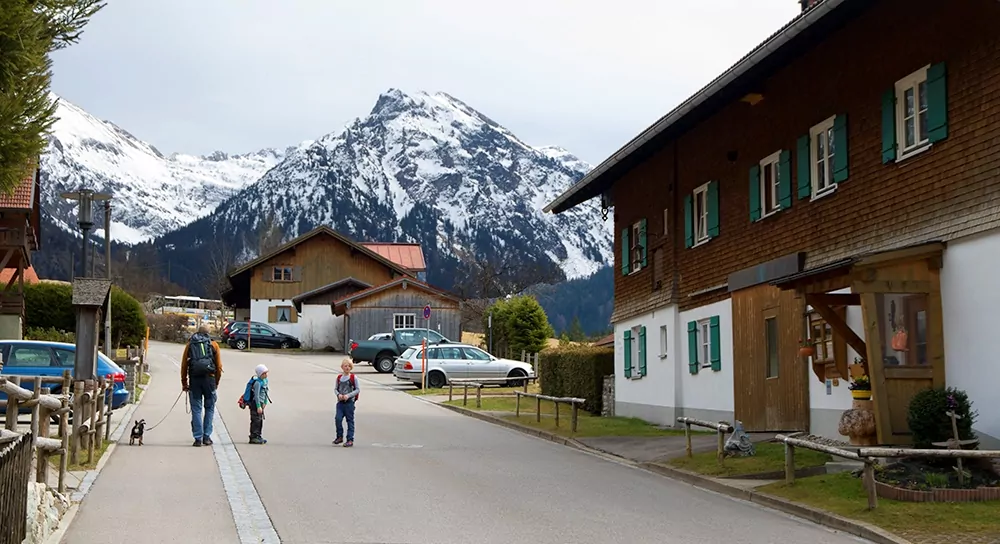
How have the children adapted to a new culture and language?
When it comes to the children's adaptation in their new country with a new language and a new culture, things have gone well but it has been tough. The most difficult thing has of course been the language. Suddenly not being able to communicate unhindered with teachers and children at the preschool was a huge adjustment.
Following your children as they slowly conquer a new language has meant both sad and happy moments as there have been some misunderstandings, fights and reprimands due to language difficulties. The happy moments that have warmed our parental hearts have been when they have been invited to parties, started talking to other children in the playground and found friends in the houses on our street.
Something I want to highlight now that I have the chance is how so many adults view children's path to acquiring a new language. Perhaps it's ignorance, inexperience or wishful thinking but children, contrary to what many have told us in good faith, are not like "sponges" when learning a new language.
It may feel that way to us adults when children suddenly know things we don't understand how they learnt BUT, after all, enormous amounts of energy are required for this "absorption". Children generally have a lot of energy, but also need recovery of the brain, which otherwise becomes overheated and gets into trouble.
To see children's learning process as being like a sponge, just soaking up information which then, without processing, becomes useful knowledge, I believe is to grossly minimise their struggle to adapt to their new environment. I have written more about this in the post "Children are not like sponges" to highlight the situation of many children in a new country.
This is not to say that I think our children have been harmed in any way by changing environment and learning a new language, quite the contrary! They came here with their safe family under safe circumstances, which I believe are some of the best conditions. I am very proud of them, that they are now bilingual and doing well in both languages. However, I will never say that children are like sponges after seeing how tired their little brains could be in the afternoons of the first year, never.
Can you tell us about any culture clashes you have experienced?
Although Germany is a neighbouring country to Sweden, there are a lot of cultural differences. The list is long, but here are some everyday examples.
- We like to say that Germany is in many ways like the United States. Sweden in the 1960s. Whether it is positive or negative is up to each individual. Joint taxation, housewives, secretaries, poorly developed childcare, addressing strangers and older people as Herr, Frau or Sie (you) and titles are important. Although digitisation has come further than it did in Sweden in the 1960s, payments are still mostly made in cash and e-ID and Swish are unknown concepts. Filing a tax return is a process that most people use to help them sort out which papers, certificates and forms to submit. Far from the split-second process in Sweden.
- Here belongs the kitchen interiori.e. cupboards, benches, white goods, oven and hob in most cases the tenant. You pack your kitchen when you move, which is very unusual for us but not uncommon in many European countries.
- Another thing is how you look at candy and sweets for children. Saturday sweets or even just eating sweets one day a week is a completely unknown phenomenon here. Here, babies are offered gummy bears and in the nursery and school, nutella pancakes are sometimes offered for dessert. At the doctor's you get a lollipop as a reward, and at the school reception there is a candy bowl. Many primary school children have dark shiny metal crowns on their teeth and all children go to the dentist twice a year instead of once like in Sweden. Probably on an ad hoc basis.
What are the best and worst things about living in Germany and Bavaria?
+ The best, in my opinion, is clearly the Alps! It's amazing to have the mountains so close that you can go there for the day and hike, I really love it. It is also very exciting, albeit exhausting, to learn a new language in a way that is only possible in a country where everyone speaks the language on a daily basis.
– It's pretty much conservative here and we are more liberal than most people we meet when it comes to equality, gender equality, LGBTQ issues and the like. It can be a little frustrating as we want our children to learn, and never doubt, the equal value of all people and that all love is of equal value, that you can wear whatever clothes, hairstyles and jewellery you want as long as you like it yourself.
Can you give your top 3 tips for anyone planning to visit Bavaria as a tourist?
1. the Alps
If you like nature, hiking and uncomplicated outdoor activities, the Alps are the obvious choice in Bavaria! Here you can stay in everything from luxury hotels to Bed & Breakfast in a valley, ride cable cars up to a higher altitude and make day trips among green alpine meadows with snow-white peaks in the background. Trails really do come in all levels of difficulty, ranging from gravel roads passable with a pram to trails where you almost climb.
3. See more than just Munich
Munich may be one of Germany's largest cities, but if you want to get away from the touristy city and see more of the even more cosy and homely Bavaria, head to one of the many smaller towns. Nuremberg, Augsburg, Regensburg and Ingolstadt are some examples if you don't want to go up to a small alpine village in the mountains.
3. skip the motorway
The Autobahn is Germany's world-famous and well-developed major motorway. It allows you to get where you're going relatively quickly as there is almost no speed limit. BUT, if you are not in a hurry, choose the roads next to the Autobahn, you will not regret it. Then you have more opportunities to stop when a cosy village appears and there are many in Bavaria.
The Autobahn is also not for the fussy driver as speeds are high and even though you may be travelling at 130 km/h, there is a steady stream of passing vehicles. Queues are also common as accidents and roadworks are extremely common. Choose the slightly smaller motorways or country roads if you can and remember that studded tyres are not allowed in Germany!
What are your plans for the near future? Will you stay put? Will you be travelling?
We love it here but will be moving back to the city in due course. Sweden. Although we have the Alps and several major exciting cities and countries nearby, we long for the Swedish nature. A nature where you can actually be on your own if you want to. Being alone in nature is difficult here in Germany where it is so much more densely populated than in Sweden. We don't know if we will move back to Sweden for good or just stop over for a while, time will tell.
What we do know is that we will continue to travel. And since we are very much into discovering the region we live in, it will probably continue to characterise our adventures to a large extent, regardless of which country we live in. However, there will be some detours from time to time, the next will be to Uganda in December. It will be crazy exciting!
Finally, a question we ask everyone we interview: What is your dream destination?
As you may have realised, I have a weakness for beautiful and exciting nature. My extra weak points are mountains and the sea. The mountains of the Andes would be incredibly cool to experience, but I also dream of seeing the waves of the Atlantic hitting the beaches of the Shetland Islands.
Animals are also one of my great passions, so whale watching, savannah safaris and snorkelling in some animal-rich environment are high on my list. I do not know where in the world I would get as many as possible of these dreams, maybe you as a reader can give me tips?
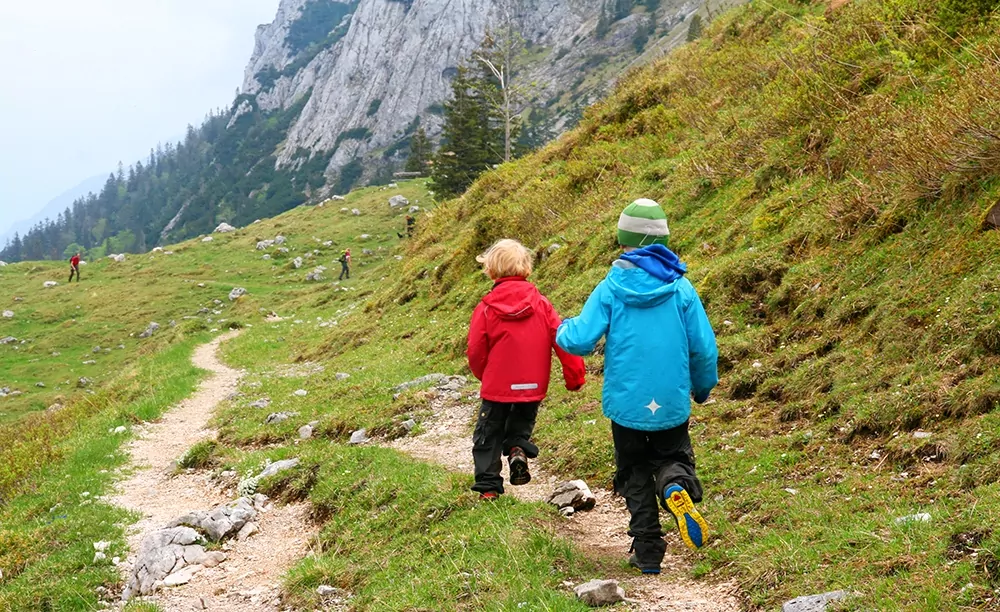
Thank you Linnea Edmark for sharing your experiences and thoughts!
Top photo: Linnea Edmark and her children Atlas and Sirius in Garmisch-Partenkirchen.


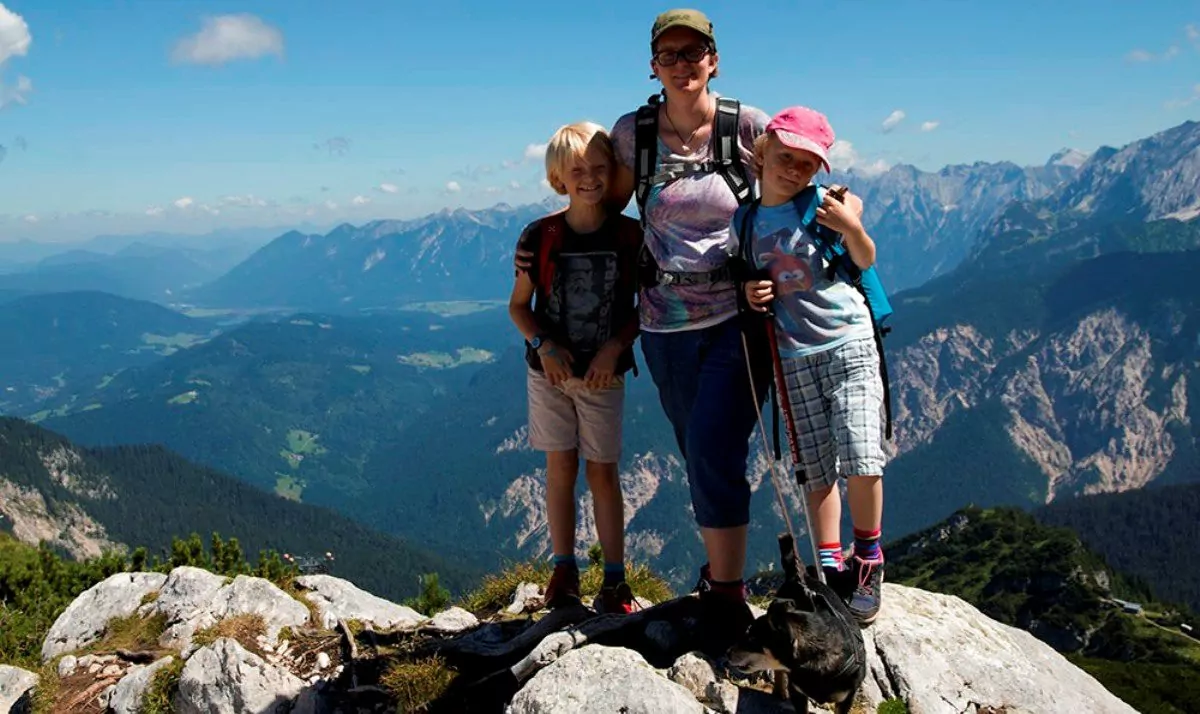






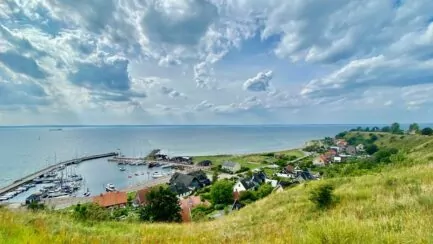



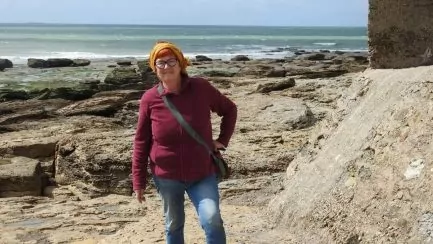



LinizTravel says:
Exciting to read about all your guests!!! Fun to
Seen on
Moon!!! Hugs
01 October 2016 - 8:31
Matts Torebring says:
What a great post! So deeply analytical and child-centred. Very good! Some things I am the first to sign up for. Not living in the big city! Just enjoy the Alps, it must be wonderful. Then I didn't think the culture clashes were so big. Better start reading up.
01 October 2016 - 9:00
Lena - good for the soul says:
Wonderful report! Fun to read even though I have been following Linnea for some time. Did not know that Germany is so far behind in many areas. Nice with such a big focus on the children!
Hug Lena
01 October 2016 - 9:18
Goatfish says:
I also follow Linnea a little bit.
However, this gave a deeper insight into the family's everyday life and it was interesting to read about 'the children's perspective'.
Even though I have and have had a lot of contact with Germany, this gave a deeper knowledge. Thank you very much!
Kram, Gerd
01 October 2016 - 9:52
Ditte says:
Thank you for another interesting and exciting Saturday interview.
I know that Germany can sometimes feel a bit "old-fashioned" in several respects and there was a lot here to think about. But everything has advantages and disadvantages.
"When it comes to children and language, it's quite complex and coming directly into a completely German-speaking environment in school takes a lot of energy.
I partly recognise this from Beijing, where I lived for four years and most children gradually became bilingual with Swedish, Chinese and English).
Being surrounded by a language, both as a child and an adult, and spending time in environments where a language is spoken is a great way to learn a new language, but it is also tiring.
We had friends who chose to have their children in Chinese-only schools and it was a different experience but also rewarding.
Wishing the family good luck!
01 October 2016 - 10:59
Mr Steve says:
Interesting reading. Ordinary family life can also be an "adventure abroad" I see. I am surprised by the differences between Sweden and Germany.
Interesting views on children's learning that turn the 'sponge theory' on its head.
Uganda, it will be a stark contrast in December.
01 October 2016 - 12:30
Ama de casa says:
01 October 2016 - 15:18
Husis blog says:
Interesting reading. Can agree that there is much more than Munich to see. We ourselves were in a town called Herzogenaurach this summer and it can also be recommended.
01 October 2016 - 17:37
BP says:
Very interesting reading! Bavaria is Germany's most conservative state, so I understand the cultural clashes that the family had not anticipated. Like AMA, I like the coincidence of the similar place names:-)
01 October 2016 - 17:38
steel city anna says:
But maybe it depends on where you've been, because Germany is a big country.
Interesting reading!
01 October 2016 - 17:45
Veiken says:
Very interesting to read about everyday life in Bavaria. I have a school year in Switzerland behind me and I grew as a person there.

01 October 2016 - 18:00
Husis blog says:
Interesting post and reading but was a bit surprised by some differences between Sweden and in this case Germany. Sounds a bit hard to bring the kitchen and its equipment to the next accommodation where it may not fit at all.
Fully agree with leaving the Autobahn and that there is not only Munich in Bavaria. We visited a small village called Herzogenaurach this summer in this area and the small village can also be recommended.
01 October 2016 - 18:28
Lanclin says:
Hello hello all readers, Lanclin-Linnea here ?
 .
.
As Steel City Anna writes, Germany is a well-organised and "tougher" country than Sweden. However, the efficiency is a truth with modification as, for example, the bureaucracy is very analogue here. Here, for example, stamps and certificates with original signatures are the only thing that applies in many cases. No mailing, e-identification or PIN coding is relevant when it comes to authorities, it makes contacts with authorities so inefficient most of the time. Rules are rules and we should all follow them, but that the school, for example, buys school materials that the parents then buy from the school (all school materials are paid for by each family) to bring down prices and all children should have equal is almost seen as communist? I think so; Germany is seen by Swedes as efficient, well-organised and tough and that is true in many ways but behind the scenes where ordinary people live their lives, it is seen a little differently. ?
01 October 2016 - 18:35
Eva - People in the Street says:
Oh what fun to read about Lancin-Linnea here! Very interesting to hear about the differences between Sweden and Germany and the progress the children are making in the language. Very good and rewarding interview.
01 October 2016 - 21:39
Maria's Memoirs says:
02 October 2016 - 10:39
Marianne - Glimpses of the world says:
03 October 2016 - 23:46